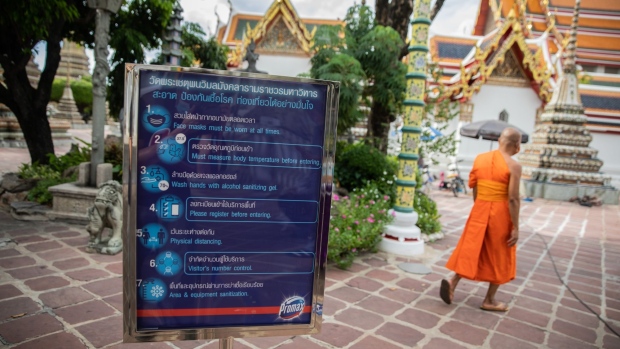(Bloomberg) -- Thailand will extend a state of emergency through October as the tourism-dependent nation gears up for the re-opening of borders to foreign visitors after a six-month gap, while maintaining its relative success in containing local transmission of the coronavirus.
The national Covid-19 task force chaired by Prime Minister Prayuth Chan-Ocha on Monday approved the extension of emergency rules through Oct. 31, according to Deputy Prime Minister Wissanu Krea-Ngam. The panel also approved special tourist visas for foreign tourists starting next month, Tourism and Sports Minister Phiphat Ratchakitprakarn said in Bangkok.
The one-month extension, when approved by the cabinet on Tuesday, would be the sixth since the initial order in March. The emergency rules allow the government to enforce mandatory quarantines and streamline disease-control plans without multiple approvals from various agencies. The measures were set to end on Sept. 30.
Thailand has managed to control the coronavirus outbreak quickly, and was able to gradually restart most parts of its economy since May. It has so far reported just over 3,500 cases and 59 deaths, and the majority of its recent cases were found in state quarantine. But its economy, which is also reliant to manufacturing, is on track for its worst contraction on record as the pandemic disrupted international trade and travel.
The limited number of visas to foreign visitors is aimed at testing the nation’s readiness for a wider tourism re-opening in the coming months as part of its efforts to boost the ailing sector. The government wants some foreign visitors to return because they made up two-thirds of the country’s tourism receipts before the pandemic, and many businesses are struggling to survive a long period without foreign visitors.
Seeking Balance
The Southeast Asian nation is trying to strike a balance between minimizing risks of infections and re-opening for foreign visitors who could help rescue its economy. Foreigners who wish to visit the country will need to seek a special visa, get tested for Covid-19 before departure, and agree to more tests and a quarantine upon arrival.
While the government said that there’s some interest from groups to want to stay in the country long-term, critics said the program might be too costly for many visitors, who need to pay for health insurance that can cover at least $100,000 in Thailand, a hotel quarantine, and charter or private flights.
Tourism is an important part of the Thai economy, contributing to about one-fifth of its gross domestic product. The pandemic has devastated the industry, which provided more than $60 billion in revenue from about 40 million foreign visitors in 2019.
©2020 Bloomberg L.P.








